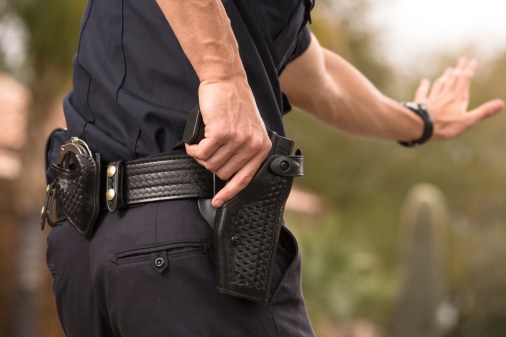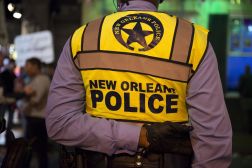Los Angeles adding smart Tasers to body camera program

The Los Angeles Police Department has already made headlines with its announcement that it will become the nation’s first large police department to give officers body cameras, but now the department is taking the decision one step further.
LAPD officials announced earlier this week that the department has signed an agreement with Taser to purchase more than 3,000 of the company’s nonlethal weapons that can interact wirelessly with an officer’s body camera.
The device, the Taser X26P Smart Weapon, connects with an officer’s camera via Bluetooth and can automatically power on the officer’s camera when the safety switch on the device is turned off.
“The Los Angeles Police Department is committed to implementing safety measures to reduce the risk of injuries to both our officers and the members of our community, while improving trust within our communities,” Los Angeles Police Department Chief of Police Charlie Beck said in a statement. “In addition to these new Taser deployments, we plan to issue a body-worn camera and a Taser device to every officer. It is our goal to make these important tools available to every front line officer over the next few years.”
The police department initially ordered 2,270 of the Taser smart weapons and then plans purchase an additional 860 as the department’s body camera program begins to take shape.
It was just last month that the department announced it will soon outfit more than 800 officers with cameras in high-crime areas in the near future and will set aside money in the 2016 fiscal year budget to purchase 7,000 more.
Many police departments around the country have begun exploring the benefits of body cameras for police in the wake of the public outcry following the police shooting of Michael Brown this past summer in Ferguson, Missouri.
While a number of major cities have launched pilot programs – Washington, D.C., for instance, is allowing officers to test a handful of different camera options – Los Angeles was the first to announce its plans to go ahead with a full program.
“Out on the street, things aren’t always clear cut. These cameras will help law enforcement and the public alike find the truth — and truth is essential to the trust between the LAPD and the community, which has been a key factor in lowering crime to record lows,” Los Angeles Mayor Eric Garcetti said in December. “I want to make sure LAPD is on the cutting edge when it comes to crime suppression and constitutional policing.”
President Barack Obama has shown his support for body camera programs, requesting $263 million from Congress to help state and local governments procure the cameras and then have the necessary training that comes with using them.
The cameras also come with a slew of information technology issues that must be addressed as recording and storing video from police officers promises to generate vast amounts of data that must be managed and protected as the video footage could be used as evidence in cases.






